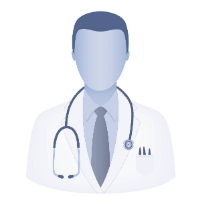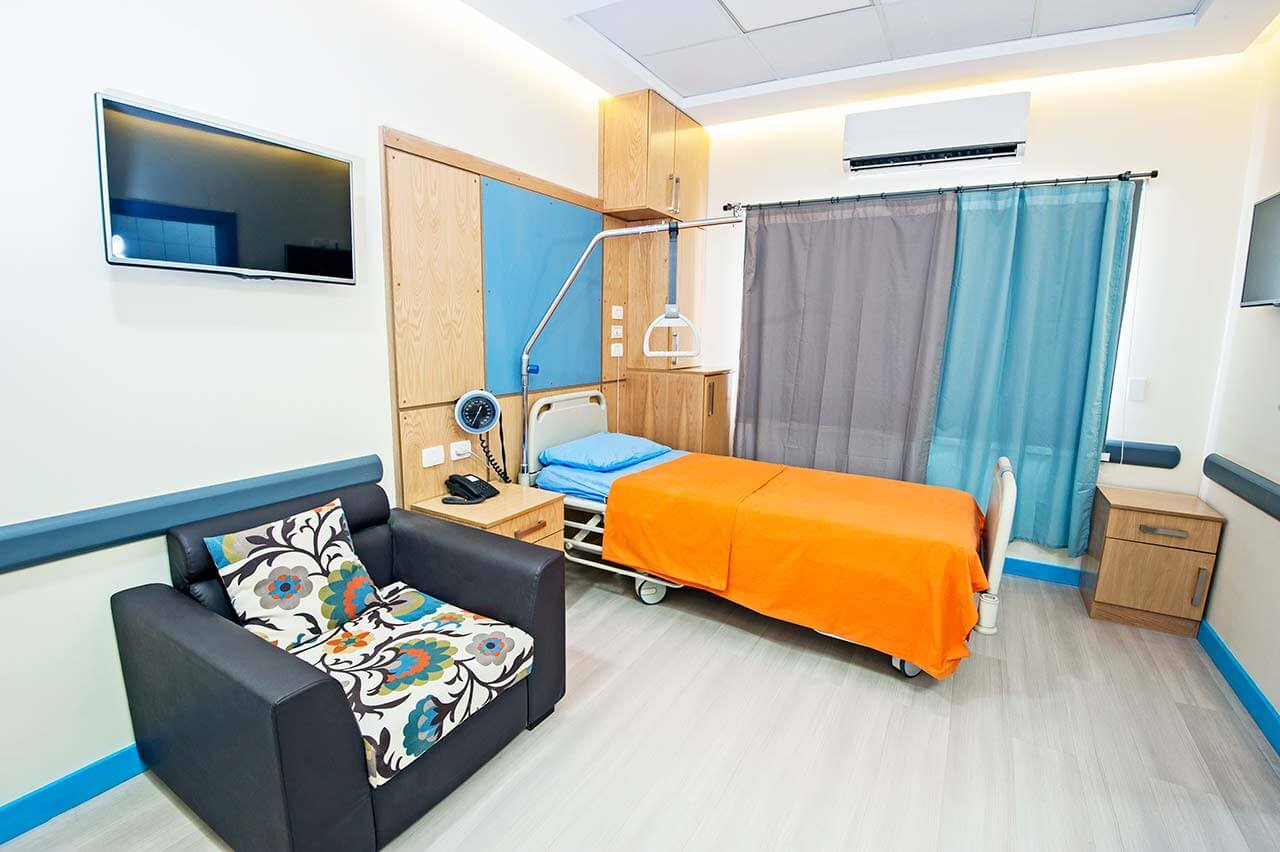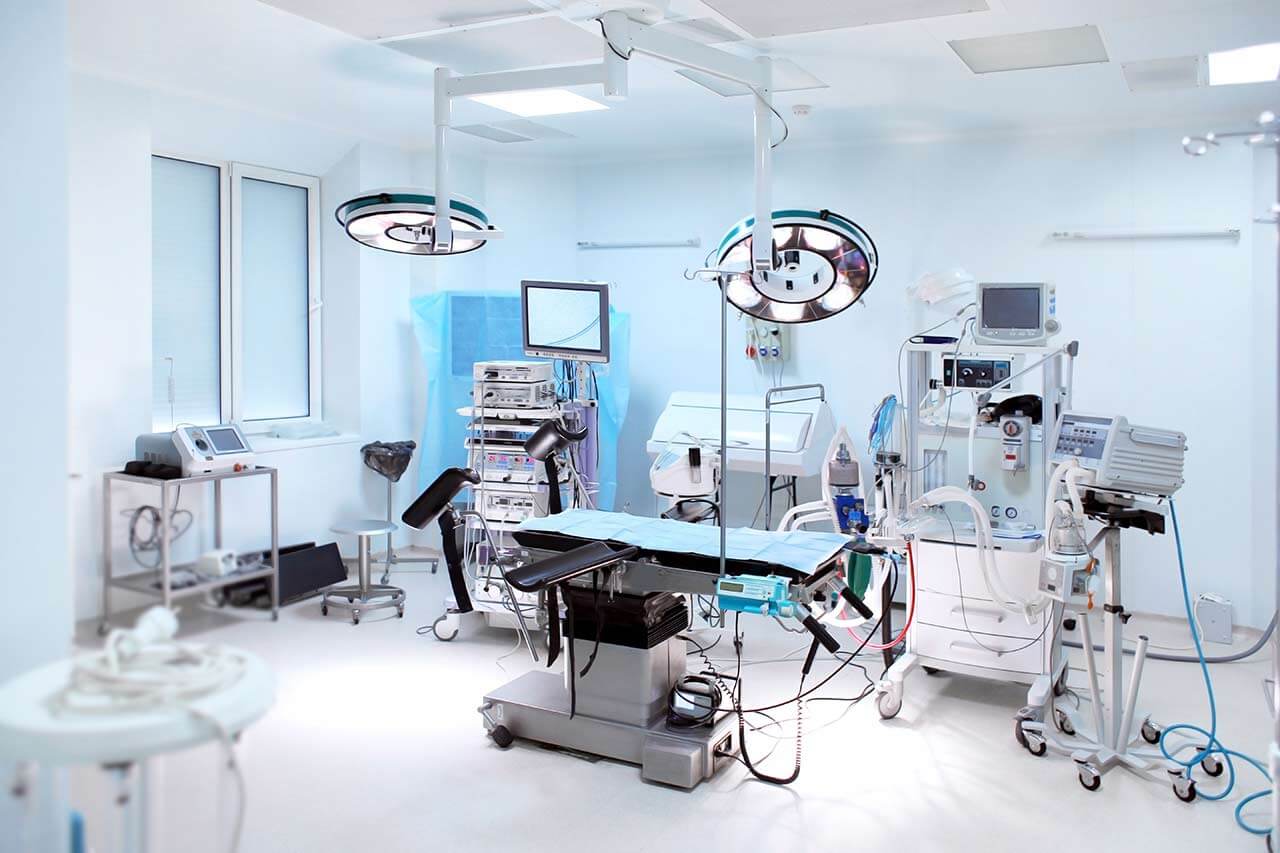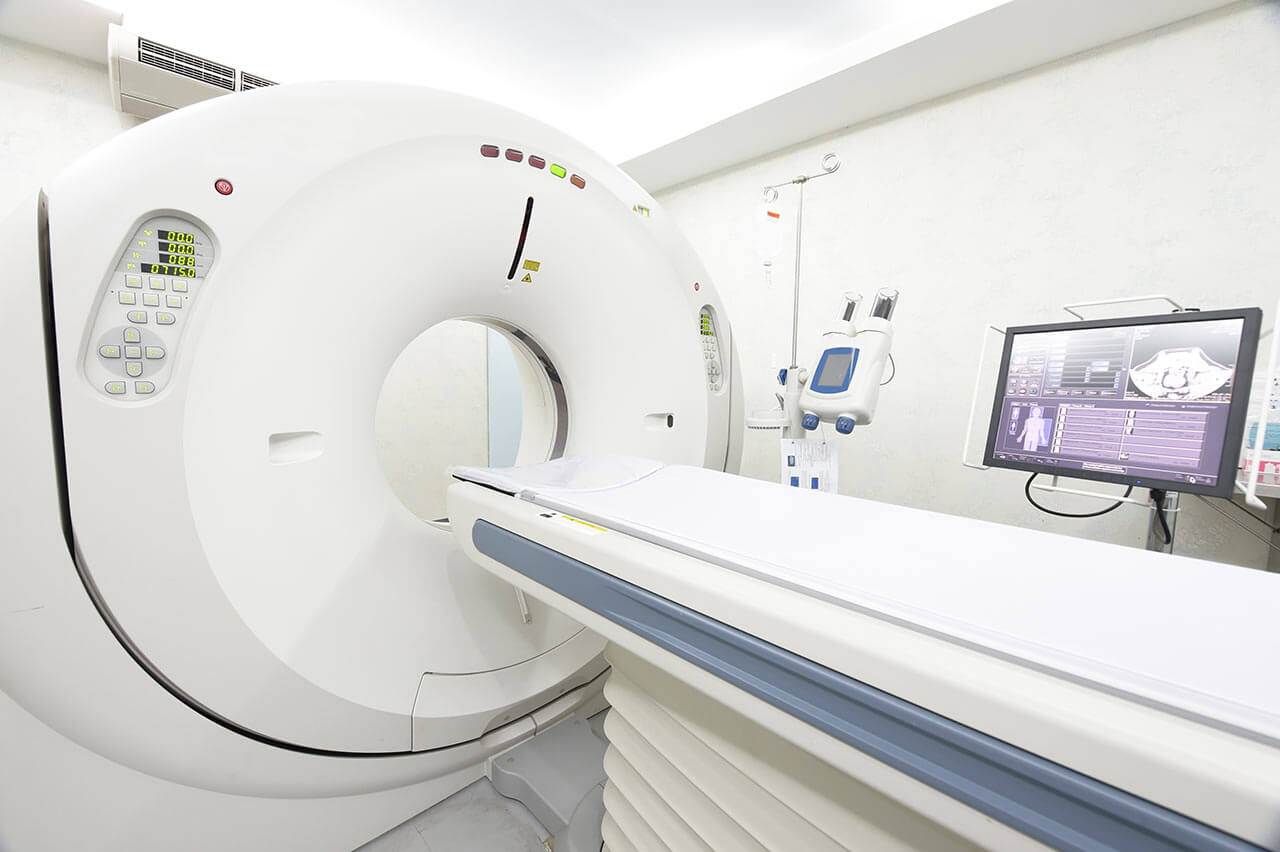
The program includes:
- Initial presentation in the clinic
- clinical history taking
- review of medical records
- physical examination
- laboratory tests:
- complete blood count
- general urine analysis
- biochemical analysis of blood
- hormonal examination (TSH, fT3, fT4)
- antibodies against thyroid peroxidase (TPO antibodies)
- thyroid ultrasound
- scintigraphy (if clinically indicated, additional cost is 1600 €)
- nursing services
- consultation of related specialists
- treatment by chief physician and all leading experts
- explanation of individual treatment plan
- written statement (the cost of the medicines is not included)
Required documents
- Medical records
- Results of hormone blood tests (if available)
Service
You may also book:
 BookingHealth Price from:
BookingHealth Price from:
About the department
The Department of Endocrinology at the University Hospital Carl Gustav Carus Dresden offers all the options of modern medicine for the prevention, diagnostics and treatment of endocrine diseases, hormonal and metabolic disorders. The department's specialists have particular competence in the treatment of thyroid diseases, diabetes mellitus and osteoporosis. In addition, the department's tasks include the treatment of pathologies of the pituitary gland, adrenal glands, calcium metabolism disorders and sexual dysfunction. To provide top-class medical care, the department has excellent diagnostic options, as well as uses effective classical and advanced treatment methods. Many patients undergo diagnostics and treatment on an outpatient basis, without compulsory hospitalization. The treatment regimen is developed for each patient on an individual basis, after an accurate study of the diagnostic results and assessment of the general health condition. The Head Physician of the department is Prof. Dr. med. Lorenz Hofbauer.
Many patients with thyroid pathologies seek medical help from the department. The most common diseases in this spectrum are nodular goiter, hypothyroidism, and hyperthyroidism. The diagnostic protocol includes the use of a wide range of laboratory tests and instrumental examinations. To treat thyroid diseases, the department's doctors use various drug therapy regimens, including thyrostatic drugs, iodine-containing drugs, symptomatic treatment and hormonal therapy. The patients are often prescribed diet therapy and physiotherapy procedures that contribute to the achievement of a successful treatment outcome. The attending physician selects a particular set of therapeutic measures based on the results of the patient's preliminary diagnostics.
An integral part of the department's clinical practice is the prevention, diagnostics and treatment of type 1 and 2 diabetes mellitus. To prevent the pathology, the specialists of the medical facility recommend leading a healthy lifestyle – revising the diet and eliminating harmful eating habits, normalizing body weight, and paying attention to regular physical activities. If diabetes mellitus has already been diagnosed, the doctors focus on symptomatic therapy, since as of today there are no therapeutic methods that could cure the patient completely. The patients with diabetes mellitus are advised to follow a diet and give up bad habits (smoking, drinking alcohol). With type 1 diabetes mellitus, insulin therapy is necessarily prescribed: insulin pump therapy or subcutaneous insulin injections. With type 2 diabetes mellitus, antidiabetic agents are prescribed. In addition, it is important for a patient with diabetes mellitus to do sports regularly, walk in the fresh air and lead an active lifestyle.
The department operates a specialized Osteoporosis Center certified by the German Society of Osteology (DVO). Osteoporosis is a systemic pathology that affects all bone tissues. Various laboratory tests and the very latest types of bone densitometry (bone mineral density measurement) are used to detect osteoporosis. The main goal of osteoporosis treatment is to reduce the risk of osteoporotic bone fractures. The therapy is based on the intake of bisphosphonates, myacalcium, calcium, vitamin D, hormone drugs and painkillers to relieve pain. The patients suffering from osteoporosis are also strongly recommended to do physical therapy and walk in the fresh air.
The department specializes in the diagnostics and treatment of the following endocrine diseases:
- Thyroid diseases (nodular goiter, hypothyroidism, hyperthyroidism)
- Type 1 and 2 diabetes mellitus, gestational diabetes mellitus
- Diabetic foot syndrome
- Osteoporosis
- Metabolic disorders, including calcium metabolic disorders
- Pituitary diseases
- Adrenal diseases
- Obesity due to hormonal disorders
- Infertility due to hormonal disorders
- Hirsutism (excess body hair growth) in women
- Other endocrine pathologies
The department's diagnostic and therapeutic options include:
- Diagnostics
- Laboratory tests (for example, hormone testing, functional tests, bone metabolism markers and tumor markers)
- X-ray scanning
- Computed tomography
- Magnetic resonance imaging
- Bone densitometry (DEXA) – a method for measuring bone mineral density
- Scintigraphy
- Treatment
- Drug therapy
- Insulin therapy for diabetes mellitus
- Diet therapy
- Other medical services
Curriculum vitae
University Education
- 1988 - 1994 Study of Medicine, Ludwig Maximilian University of Munich; Practice in Nice (France) and Nagoya (Japan); one- year practice: Mayo Clinic, Rochester; Bellevue Hospital – New York University, New York; Massachusetts General Hospital, Boston; Yale New Haven Hospital, New Haven (USA).
- 1990 - 1994 Konrad Adenauer Foundation Student Scholarship.
- 28.10.1994 Third State Medical Examination, Munich, partial medical license.
- 1995 Thesis defense. Subject: "Regulation of mRNA expression of insulin-like growth factor 1 in intact follicles of the thyroid gland of pigs with thyrotropin and iodide".
Postgraduate Training and Medical Practice
- 1995 - 1996 Intern, Innenstadt Hospital of the Ludwig Maximilian University of Munich, full medical license.
- 1996 - 1999 Internship in the Department of Endocrinology, Mayo Clinic, Rochester, USA.
- 1999 - 2003 Research Fellow, Department of Gastroenterology and Endocrinology, Philipps University of Marburg.
- 2002 Habilitation in Internal Medicine. Subject: "RANK and the osteoprotegerin system as paracrine mediators of bone tissue metabolism: cellular biological, molecular biological and clinical epidemiological studies".
- 2003 Board certification in Internal Medicine.
- 2004 Specialization in Endocrinology; certification "Diabetologist DDG" (German Diabetes Society, DDG); Senior Resident at the Center for Internal Medicine.
- 2004 - 2006 Postgraduate course in Healthcare Management at the Institute of Economics, Philipps University of Marburg.
- 2004 - 2007 Scholarship of the German Research Foundation within the Heisenberg Program (HO 1875/3-1 and 3-2).
- 2005 Senior Physician, Center for Internal Medicine, Philipps University of Marburg; "Osteologist DVO" (Osteology Society) certification; additional specialization in Sports Medicine; certification in Radiation Protection Training.
- 2006 Invitation to the position of C3/W2 Professor for Internal Medicine (Molecular Endocrinology and Osteology), Justus Liebig University Giessen (invitation declined).
- Since 01.05.2007 C3/W2 Professor for Internal Medicine (Endocrinology and Metabolism), Dresden University of Technology.
- Since 1999 Theoretical course (one-year practice) in Internal Medicine (for those studying medicine, dentistry, human biology and intensive care, introduction to the pre-clinic).
Scientific Awards and Honors
- 1998 Julius Wolff of the Board of Trustees of the Bone Health Society.
- 1999 John Haddad Young Investigator’s Award of the American Society of Bone and Mineral Research.
- 1999 Merck Senior Fellows Award of the Endocrine Society.
- 2000 Edward C. Kendall Alumni Science Award for Meritorious Basic Research
- der Mayo Clinic.
- 2000 Von Recklinghausen Prize of the German Society of Endocrinology.
- 2000 Karl Schoeffling Scientific Prize of the Rhine-Main Working Group on Endocrinology, Diabetology and Metabolism.
- 2001 Scientific Prize of the German Society for Osteology.
- 2001 Byk Tosse Scientific Prize for Research in Osteology.
- 2003 Poster Award of the German Academy of Osteological-Rheumatological Sciences (cooperatively with Dr. V. Viereck, University of Goettingen).
Memberships in Professional Societies
- American Society of Bone and Mineral Research.
- German Academy of Osteological-Rheumatological Sciences.
- German Diabetes Society.
- German Medical Association.
- German Society of Endocrinology (DGE).
- Endocrine Society.
- Mayo Clinic Alumni Association.
- Section "Hormones regulating calcium metabolism and bone metabolism" of the German Society of Endocrinology (DGE).
- Association for the Promotion of Research in Clinical and Experimental Molecular Endocrinology.
Photo: (с) depositphotos
About hospital
According to the reputable Focus magazine, the University Hospital Carl Gustav Carus Dresden ranks among the top five German hospitals!
The hospital is the benchmark for modern high-quality medicine. Positioning itself as a maximum care medical facility, the hospital represents all medical fields. There are 26 specialized departments, 6 institutes and 17 interdisciplinary centers, which cooperate closely with the clinical and scientific facilities of the Faculty of Medicine. The basis of successful practice is excellent equipment, which is regularly updated, as well as highly qualified, experienced medical personnel: world famous doctors and professors work here for the benefit of patients.
In addition to its main goal of caring for patients, the hospital is also active in training and professional development of medical personnel, as well as in the field of public health care. The priority focus of the work is research activity, which allows the doctors to introduce the innovative diagnostic and therapeutic techniques into clinical practice.
A special feature of the hospital is also the diagnostics and treatment of rare diseases. State-of-the-art equipment and well-coordinated work of doctors of various medical specialties make it possible to timely recognize pathologies rarely encountered in medical practice and select the most effective therapy. Specialization in rare diseases include neurology, endocrinology, hematology/oncology, and rare autoimmune diseases.
The hospital has 1,410 beds for patient hospitalization. About 55,900 inpatients and more than 233,975 outpatients undergo treatment here annually. A large medical team, consisting of about 1,000 highly qualified doctors, as well as over 2,000 nursing staff take care of the patients' health. Each patient is guaranteed an individual approach and the most effective treatment in accordance with current clinical protocols.
It should be noted that the university hospital enjoys an impeccable reputation not only in Germany, but also far beyond its borders, including Arab countries, post-Soviet states, Great Britain and the United States. Patients from different parts of the world come here for high-quality treatment for diseases of any severity. The highest credit of patient confidence is the main indicator of the fruitful work of doctors.
Photo: (с) depositphotos
Accommodation in hospital
Patients rooms
The patients of the University Hospital Carl Gustav Carus Dresden live in comfortable rooms made in bright colors and equipped with everything necessary. The standard patient room includes an automatically adjustable bed, a bedside table with a sliding table, a wardrobe, a telephone and a TV. There is also Wi-Fi (free) in the patient rooms.
If desired, patients may live in enhanced comfort patient rooms. These patient rooms have a more sophisticated design, upholstered furniture and a safe for storing valuables.
Meals and Menus
The patients of the hospital are offered a tasty, healthy and varied three meals a day. The menu is based on local cuisine and seasonal food. If you for some reason do not eat certain products, please inform the medical staff of the hospital in advance, and you will be offered an individual menu. The nutrition provided in the hospital is certified in accordance with the quality standards of the German Nutrition Society (DGE) for catering in German hospitals.
Further details
Standard rooms include:
Religion
The religious services are available upon request.
Accompanying person
Your accompanying person may stay with you in your patient room or at the hotel of your choice during the inpatient program.
Hotel
You may stay at the hotel of your choice during the outpatient program. Our managers will support you for selecting the best option.
The hospital offers a full range of laboratory diagnostic procedures (general, hormonal, tests for tumor markers, infections, antibodies, etc.), genetic tests, various modifications of ultrasound scans, CT scans, MRI and PET / CT, angiography, myelography, biopsy and other examinations. Treatment with medications, endoscopic and robotic operations, stereotaxic interventions is carried out here, modern types of radiation therapy are also used. The hospital offers patients all the necessary therapeutic techniques.
- Cochlear implantation
- Deep brain stimulation
- Treatment of benign prostatic hyperplasia with green laser
- Da Vinci prostatectomy
- Bone marrow transplantation
These are head and neck tumors, hearloss, amyotrophic lateral sclerosis, epilepsy, Parkinson disease, infertility, malignant tumors of the reproductive system, congenital anomalies of the genital organs and the urinary system, urinary incontinence, blood clotting disorders, leukemia and other pathologies.
- Otolaryngology (Center for Cochlear Implantation)
- Neurology and Epileptology
- Urology
- Oncology
- Gastroenterology and Hepatology
About 1,000 highly qualified doctors work at the hospital.





